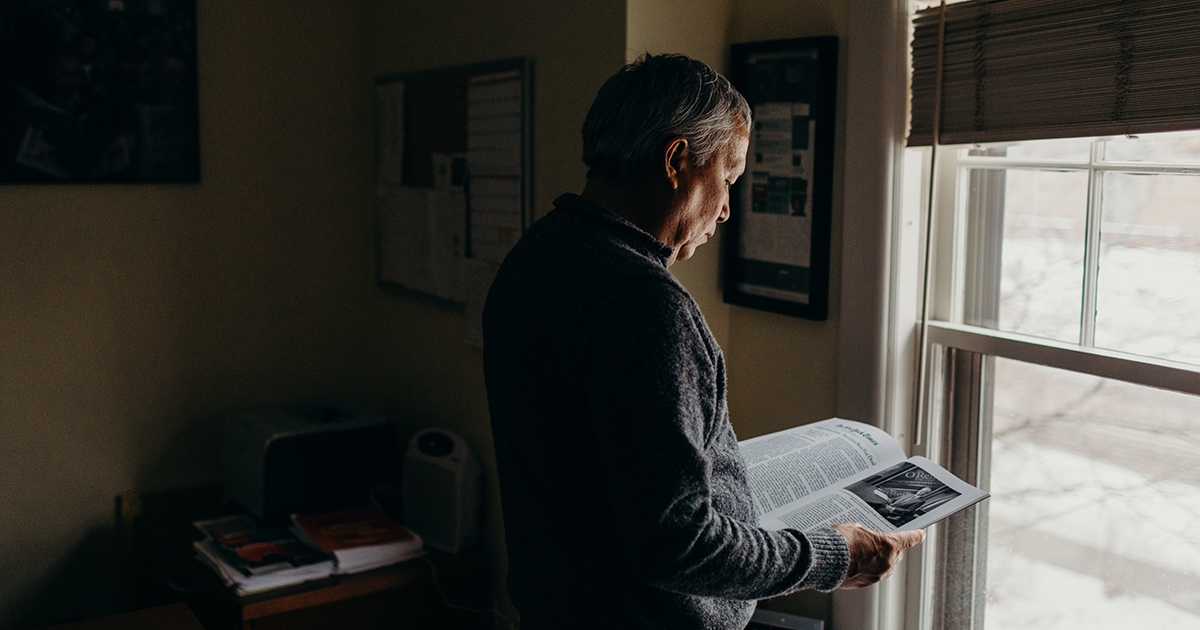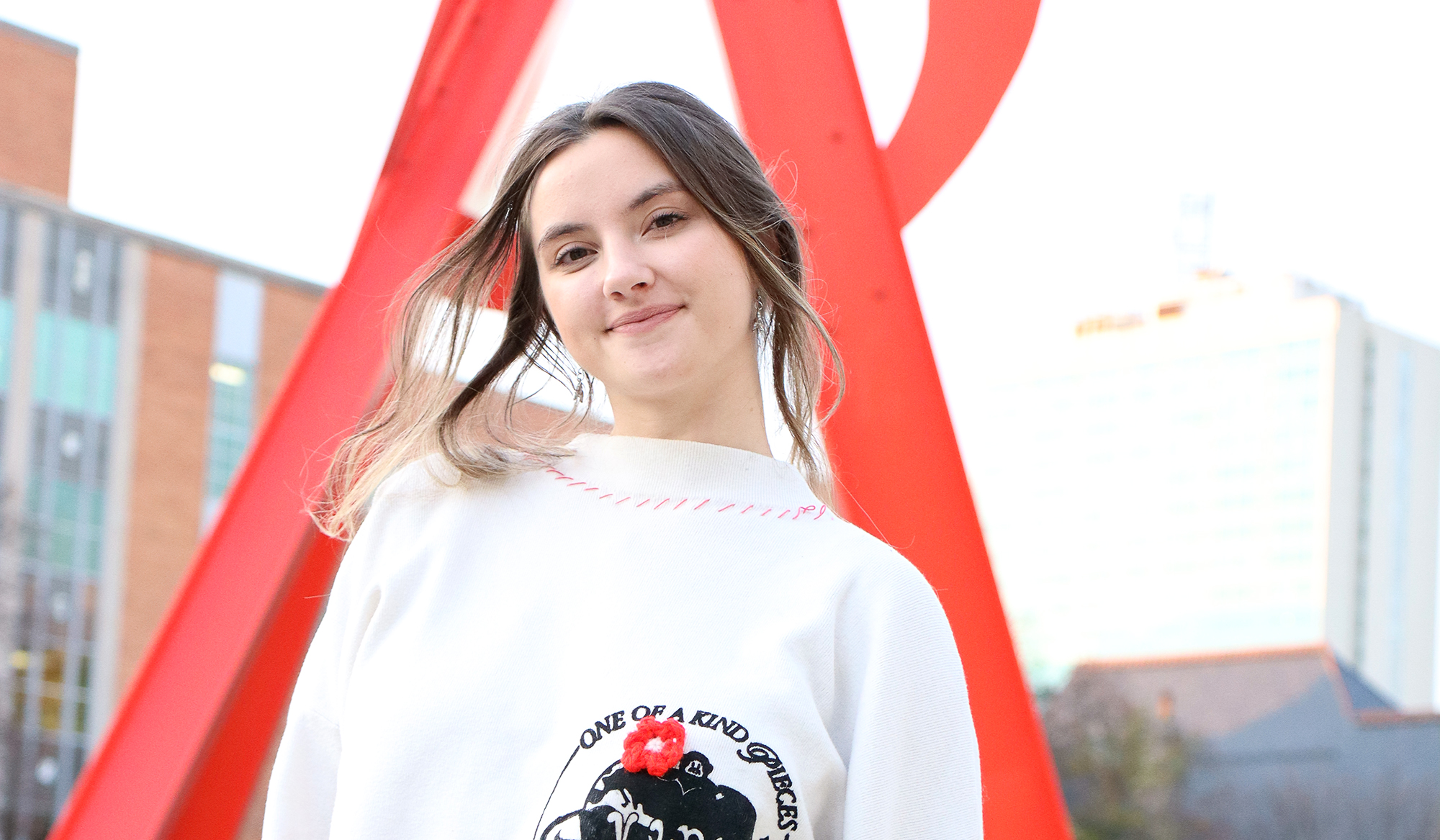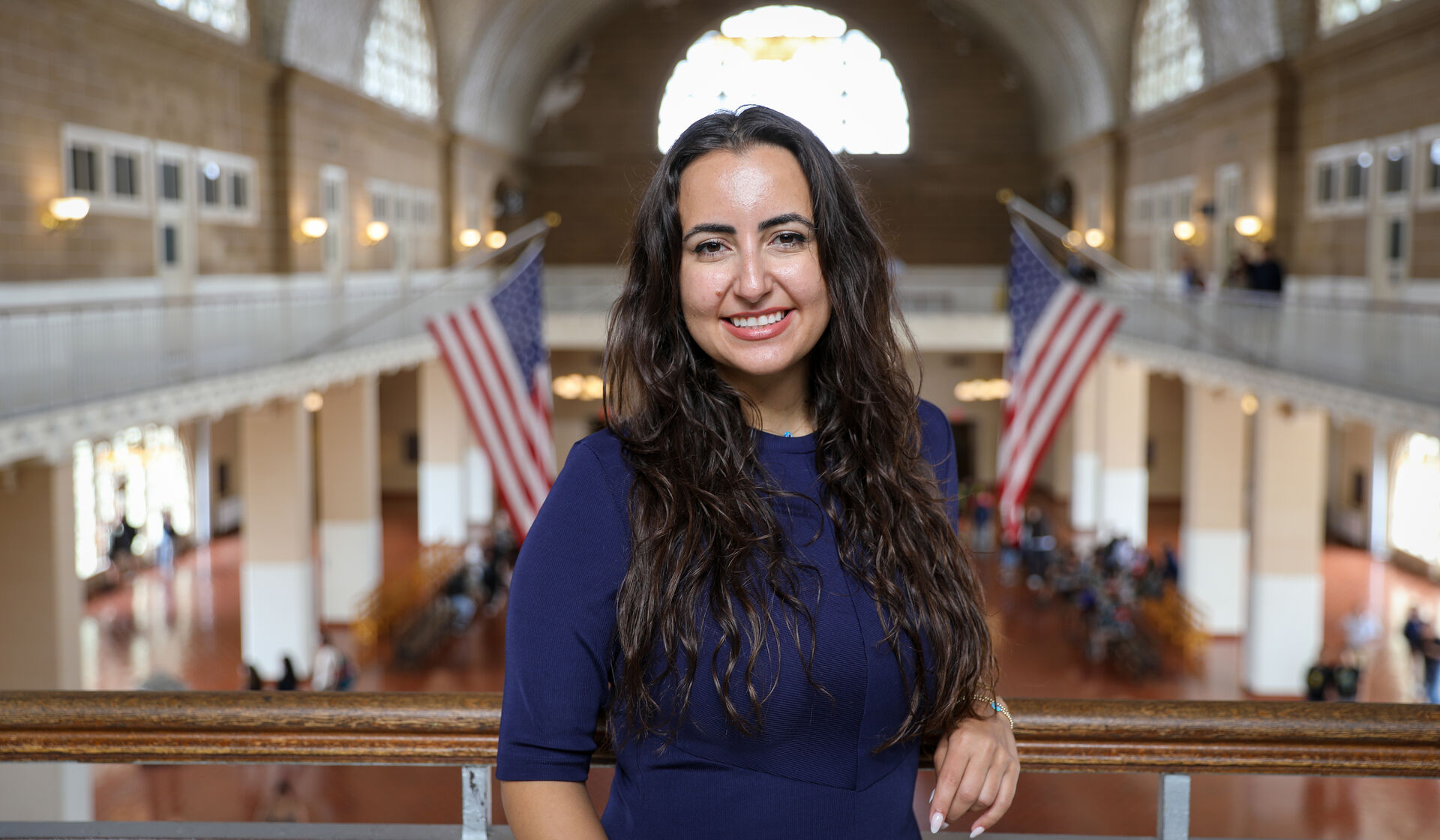For nearly a year, U-M’s Knight-Wallace Fellowship has provided a home and a lifeline for journalist Emilio Gutiérrez Soto. He is thousands of miles and several years removed from the threats by the Mexican military that caused him to seek asylum in the United States.
But the security that blanketed Gutierrez was lifted on March 4. After more than 10 years of legal limbo and occasional detainment, Gutiérrez learned that a judge had denied his asylum claim.
If he is deported, it will be to a country that wants him dead.
The news was “devastating,” said Lynette Clemetson, director of the fellowship program and a key advocate for Gutiérrez in court. She recounted the latest setback in Gutiérrez’s case. “Now we are all regrouping and trying to figure out how we continue to fight this.”
The verdict was the second time U.S. Immigration Judge Robert Hough has ruled against the 55-year-old Gutiérrez and his 25-year-old son, Oscar. On March 7, as he did the first time, Gutiérrez’s attorney, Eduardo Beckett, filed an appeal to the U.S. Board of Immigration Appeals (BIA).
“They’re tired, and they want it to be over,” Clemetson said of Gutiérrez and Oscar. “But I think they feel encouraged by the people standing up for them.”
Gutiérrez often meets with the other journalism fellows at events.
This was not the future Gutiérrez had envisioned during his years as a reporter in Mexico. But he’s trying to make the most of his time while a member of the 2018-19 fellowship program, which brings journalists to the University for the academic year while they take classes and sharpen their professional skills. At the time of the March 4 verdict, he was feeling comfortable enough in Michigan to return to writing, Clemetson said, and he’d begun to research Spanish-language news outlets in the state.
But Gutiérrez’s fellowship is about more than career development. In Ann Arbor, after a decade of struggles in immigration court and stays in detention centers, he has built a life for himself and Oscar, now in a Zingerman’s training program. He can walk the streets as he pleases without fearing arrest.
And he has found a University community that has embraced his cause and brought him some sorely needed hope. “The uncertainty, the fear, is the same,” said Gutiérrez, who wore a #FreeEmilio” pin on his sweater. Speaking in Spanish, via a translator, he added: “The only thing we have left is hope that things could change.”
Gutiérrez hails from Ascensión, a city of around 13,000 located a 1 1/2-hour drive from the U.S. border. Before reporting for a series of newspapers and radio stations there, he worked as a journalist in Ciudad Juárez, a city with a population of 1.3 million. While his stories in Ascensión were initially typical community reporting fare—a bear wandered into town, a soccer team got into a car accident—Gutiérrez then started venturing into far different territory.
He began reporting on the actions of the Mexican Army, which was working with drug cartels to terrorize the town. Reporters who covered them put their own lives at risk. In fact, Mexico is one of the most dangerous countries for journalists.
In 2005, Gutiérrez wrote a story about a group of soldiers who had robbed migrants in a local hotel. The army threatened him and Oscar if he continued to write about them. But he did continue, writing a story about their threat. At the suggestion of his editors, he began to file his pieces without bylines.
That wasn’t enough. Three years later, 50 soldiers armed with machine guns broke down his door, supposedly looking for drugs. But it was really an intimidation tactic. A friend told Gutiérrez that the military intended to kill him. “The army,” Gutiérrez said, “is the judge, jury, and executioner.”
Gutiérrez was separated from Oscar’s mother and had full custody of his son, who was then 15. The two gathered their belongings and fled for the U.S. to plead for political asylum, hoping his status as a journalist would protect them.
When they entered the country legally in June 2008, at the border crossing in Antelope Wells, New Mexico, the Department of Homeland Security immediately placed them in separate holding camps run by Immigration and Customs Enforcement (ICE) in El Paso, Texas. Oscar was freed after a few months and stayed with friends in New Mexico; Gutiérrez remained imprisoned until January 2009. Father and son then settled in Las Cruces, New Mexico, and waited for their asylum case to be heard.
For the next eight years, Gutiérrez held “asylum pending” status, which authorizes him to seek employment. But in July 2017, Hough officially denied asylum for the first time, removing their status. Gutiérrez then found a new lawyer, Beckett, who filed his first appeal with the BIA.
Three months later, Gutiérrez traveled to Washington, D.C., to accept a press freedom award from the National Press Club (NPC) and criticized U.S. immigration policy in his acceptance speech. On Dec. 7, 2017, he and Oscar made their regular monthly check-in and, despite their pending appeals, were arrested and processed for immediate deportation.
Gutiérrez and son Oscar fled Mexico in 2008 after threats from the Mexican Army. Oscar is currently in a Zingerman’s training program.
“We’ve never talked about that day,” recalled Clemetson of the time she interviewed Gutiérrez for the fellowship. She had left a senior director position at NPR in 2016 to serve as director of the Knight-Wallace Fellowships, named for the late journalist Mike Wallace, ’39, HLLD’87. She was midway through overseeing her second class of fellows in March 2018 when the NPC reached out to her.
It was gathering legal support for Gutiérrez, who had been spared from deportation when the BIA granted a last-minute appeal yet remained in detention in El Paso. To force the government to explain why he was being detained, the NPC filed a writ of habeas corpus, a legal move meant to guard against wrongful imprisonment. Kathy Kiely, the press freedom fellow for the NPC, was seeking the signatures of the heads of media foundations and press freedom organizations when she called Knight-Wallace.
Clemetson quickly agreed to sign the friend of the court brief. As it happened to be the fellowship’s application period for the following academic year, she had another suggestion. Would it be helpful to offer Gutiérrez the fellowship?
Kiely recalls sharing the news with her colleagues. ”Everyone in the office started to cry.”
Clemetson then set to work. With the assistance of the University’s vice provost, James Holloway, and the general counsel’s office, she was able to offer the fellowship for the first time in Knight-Wallace history to someone held in U.S. detention.
“For the University to stick their necks out and say we are going to put our money behind Emilio was so important and affirmed him as a journalist when ICE was questioning his credentials,” said Kiely.
When word of the fellowship reached Gutiérrez, he was struggling with the daily conditions of his detention center. He would later describe being forced to sleep on the ground, verbally abused by officers, and denied medical treatment.
“I would not wish (this) on any earthly inhabitant,” he wrote in the Columbia Journalism Review.
Beckett gathered the necessary paperwork for the fellowship from Gutiérrez in detention, and Clemetson flew to El Paso in April 2018 to conduct a formal interview.
“We were in a little room with a little round steel table and a two-way glass,” Clemetson recalled. “Emilio and Oscar were there, their lawyer was there, and I was there, and we had two guards watching us outside, through the glass.” The father and son, Clemetson remembered, were both wearing blue prison jumpsuits and ankle monitors.
Gutiérrez was able to accept the fellowship offer in May 2018, once the BIA ordered a new asylum hearing that changed his status from “asylum denied” back to “asylum pending.” Once again, he had the legal right to work in the U.S. and receive the stipend that came with the fellowship. For the moment, it was another lifeline.
The Gutiérrezes were released on July 26, 2018, one day before a separate court-ordered deadline for Homeland Security to produce evidence explaining the reasoning behind their detention in the NPC’s habeas corpus case. The father and son, accompanied by Clemetson, headed from El Paso to Ann Arbor.
Lynette Clemetson, director of the fellowship program, has been a key advocate for Gutiérrez.
At the University, Gutiérrez tries to keep a low profile. He gets many interview requests, but Clemetson declines most of them.
“A lot of requests are just, ‘Tell us about the night that the military came into your home and held you at gunpoint with your son. Tell us about what it was like in detention,’” she said. “And it’s just not fair to have to relive that over and over again. It’s not healthy.”
Instead, he has focused on his classes and the fellowship. Israeli journalist Itai Anghel speaks a bit of Spanish and has become one of Gutiérrez’s closest friends. The two took an Afro-Cuban drumming class—where Gutiérrez sometimes sang “Oye Como Va”—in the fall semester. He called it “therapy.” Sitting next to his friend, Anghel pulled up a cell phone video of Gutiérrez serenading his newborn with a Spanish lullaby.
“You get to know a guy, and you understand that it’s not for granted that you’re going to see him next week,” Anghel said.
In October 2018, Gutiérrez, Beckett, and Clemetson returned to Hough’s chambers in El Paso. Awaiting the judge were hundreds of pages of documents, including amicus briefs and letters of support from various press freedom organizations. These asserted that Gutiérrez had been targeted by the Mexican Army because of his journalism and that if he were to be deported, he would likely be killed.
Among the evidence were more than 80 of roughly 154 articles Gutiérrez had written while in Mexico. To secure this evidence, Clemetson had received help a few weeks earlier from the broader University community.
Because the judge had previously questioned Gutiérrez’s credentials as a journalist, Beckett had submitted an archive of past stories he’d written for Mexican newspapers. But the articles were all in Spanish, potentially making it easier for the court to ignore them. Beckett contacted professional translators, but none would take an assignment that large in such a short amount of time.
“This is a heavy-duty job,” the lawyer said. “I could not find anybody to do it.”
Fortunately, U-M’s Language Resource Center was holding its annual “Translate-a-thon,” where students and local volunteers gather to translate documents for nonprofits and social groups. Clemetson approached Julie Evershed, the center’s director, with a question. Would they be able to translate some of Gutiérrez’s old articles into English for the court?
“I thought we could do it, and I didn’t know of how else they were going to get it done,” said Evershed. “I just told Lynette, ‘Let’s see what you’ve got, and we’ll do what we can.’”
The center had 10 days to translate as many articles as possible before the court’s deadline. A team of around 80 volunteers, most of them first- and second-year Spanish students as well as journalists, set to work to make sure the translation of the articles was accurate and written in the style of a newspaper. Gutiérrez visited to thank them.
Evershed stayed up until 3 a.m. every night during the week of the translations, organizing the documents in a shared Google Drive. Sometimes in the dead of night, she saw another colleague in the same document.
“Oh,” she wrote in a comment, “you can’t sleep either.”
While in Ciudad Juárez, Mexico, Gutiérrez worked for nearly all of the 1990s as a correspondent, radio reporter and editor, and founding editor of Revista, an investigative magazine that focused on corruption.
Over the course of a long October day in El Paso, fortunes turned once again.
The judge delayed Gutiérrez’s asylum hearing while he met with the attorneys in chambers. During these discussions, according to Beckett, Hough revealed he hadn’t read the new evidence, including the translated articles, because the court did not have the complete file sent from the BIA.
Beckett returned to his office and picked up copies of the missing files to take back to the court. (The original files eventually turned up in a different court.) Despite having no time to review the documents, the judge insisted on pushing through with the hearing that day. Meanwhile, Gutiérrez and Clemetson had waited more than eight hours to testify.
When Gutiérrez finally took the stand, he told the judge, “I must implore you for my life.”
In the end, Hough agreed to delay his verdict in the case until January 2019 to allow time for him to review the new documents. In yet another twist, the government shutdown that stretched from Dec. 22 to Jan. 25 closed Hough’s courtroom, delaying the verdict the judge had planned for January until this March.
But the final decision on March 4 was bleak. In his deportation ruling, Hough asserted that Gutiérrez’s fears for his safety weren’t credible, claiming that he hadn’t written enough articles about government corruption to be considered a target and that Mexican press freedom laws would protect him from a vengeful military.
Hough also claimed that Gutiérrez’s status as a journalist “was never an issue before the court,” negating his own earlier questioning of Gutiérrez’s credibility and the months of work the University and allied press organizations had done to establish his journalistic background for the court.
Beckett had been preparing an appeal since before the decision came down, saying Hough insinuated to him in chambers that he intended to rule against his client. Beckett’s new appeal will likely take another few months to process.
Once again, Gutiérrez will be in legal limbo, but he and Oscar will be protected from deportation while they wait. During appeal, Gutiérrez also retains the right to live and work in the U.S., meaning he should at least see the end of his fellowship. He’s also eager to return to journalism, and Beckett hopes his client will stay in Michigan and find work after his fellowship ends. Clemetson said she and the other organizations in Gutiérrez’s camp will also be appealing to Congress on his behalf.
Beckett and the NPC also have filed Freedom of Information Act requests; they say released internal communications show that Homeland Security targeted Gutiérrez for deportation, knowing he was a journalist despite making him and the University translators prove this for the court. Beckett believes they also show that the judge is not acting impartially. He hopes to use the documents to request Hough’s recusal or move the trial to Michigan.
Meanwhile, Gutiérrez is feeling the strain of a decade-long court battle. “It’s been 10 years with this judge,” he said. “And our case has never moved forward.”
In the past, he’s wanted to give up and accept the government’s deportation ruling. “There were times when he just called me and said, ‘I can’t take it anymore. I’d rather die in my country,’” Beckett said. “I just had to tell him, ‘Look, Emilio, they’re fighting for you.’”
Since the original article went to press, much has happened in the case of Emilio Gutiérrez Soto. U.S. Reps. Debbie Dingell and Fred Upton, both of Michigan, have asked immigration officials to halt his deportation. Dingell also has introduced a “private” bill that applies specifically to Gutiérrez and his son, Oscar, and would grant them asylum.
Dingell introduced the bill March 12, the same day the National Press Club (NPC) presented Gutiérrez with an honorary membership card during a Knight-Wallace event at Lydia Mendelssohn Theatre. As Gutiérrez fought back tears, the audience of more than 100 rose to give the Mexican journalist a standing ovation.
The NPC regularly bestows honorary memberships to journalists whose safety has been threatened, but this is the first time in the organization’s history it has done so for someone who is not a U.S. citizen. NPC director Bill McCarren, Knight-Wallace Fellowship director Lynette Clemetson, and Washington Post columnist Jason Rezaian presented Gutiérrez with the honor.
“I have so much gratitude for the University of Michigan,” Gutiérrez said afterward, in Spanish, standing alongside Oscar. His fellowship will end in April, but he plans to stay in the Ann Arbor area through the appeals process.
The Knight-Wallace event featured Rezaian, who was the Washington Post’s Tehran bureau chief until he was imprisoned by Iran for more than a year on false espionage charges.
He was visiting the University to promote his memoir “Prisoner,” but in light of the developments concerning Gutiérrez, Rezaian spent most of his stay with Gutiérrez, writing a column for the Washington Post on his case. His stay also occasioned the first time the current Knight-Wallace class had gathered in one place after the judge’s ruling, and emotions at the theater ran high.
“He’s a journalist persecuted in another country,” Rezaian said of Gutiérrez. “We are about to send him back to said country, where he faces an almost certainly terrible fate.”
Andrew Lapin, ’11, covers media for Current, a trade paper for public broadcasting. He is also a RIAS Berlin Journalism Fellow and film critic for outlets including NPR, Vulture, and The Economist.
He received translation assistance for this story from Anders Kelto, a 2018-19 Knight-Wallace Fellow, and Gitzel Puente.





